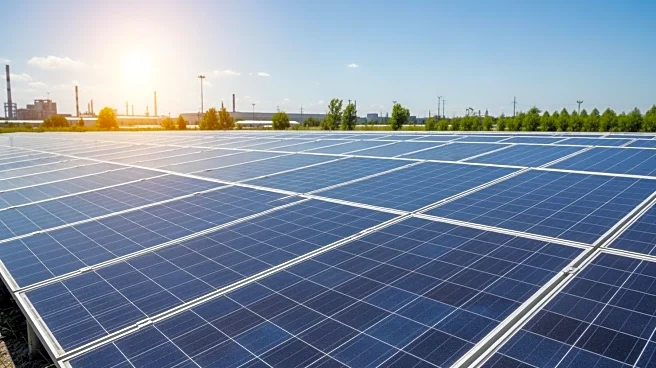What's Happening?
First Gen Corporation, in collaboration with Hocheng Philippines Corp., has successfully activated a 660-kilowatt solar power facility at HCG's manufacturing plant located in Dasmariñas, Cavite. This development
follows an agreement made in October of the previous year, with construction commencing shortly thereafter. First Gen, which has been supplying geothermal power to HCG since 2020, partnered with Pi Energy Inc. for the construction of the solar facility. The initiative is part of HCG's broader sustainability efforts, aiming to reduce carbon footprints and power costs, thereby enabling the company to invest in more efficient and environmentally friendly solutions.
Why It's Important?
The activation of the solar facility marks a significant step in HCG's sustainability journey, reflecting a growing trend among manufacturers to adopt renewable energy sources. This move not only helps in reducing operational costs but also aligns with global efforts to combat climate change by minimizing carbon emissions. For First Gen, this project enhances its portfolio in renewable energy solutions, potentially attracting more partnerships and investments. The collaboration underscores the importance of corporate responsibility in environmental conservation, setting a precedent for other companies in the region to follow suit.
What's Next?
With the solar facility now operational, HCG is expected to experience reduced energy costs, which could be redirected towards further innovation in sustainable manufacturing practices. The partnership between First Gen and HCG may pave the way for future collaborations in renewable energy projects, potentially expanding to other manufacturing sites. As the demand for sustainable solutions grows, both companies might explore additional renewable energy initiatives, contributing to the Philippines' overall energy transition goals.
Beyond the Headlines
The successful implementation of the solar facility highlights the ethical dimension of corporate sustainability, emphasizing the role of businesses in addressing environmental challenges. This development could inspire other companies to consider similar investments, fostering a culture of sustainability within the manufacturing sector. Long-term, such initiatives may lead to significant shifts in industry standards, promoting cleaner production processes and influencing regulatory policies on renewable energy adoption.









